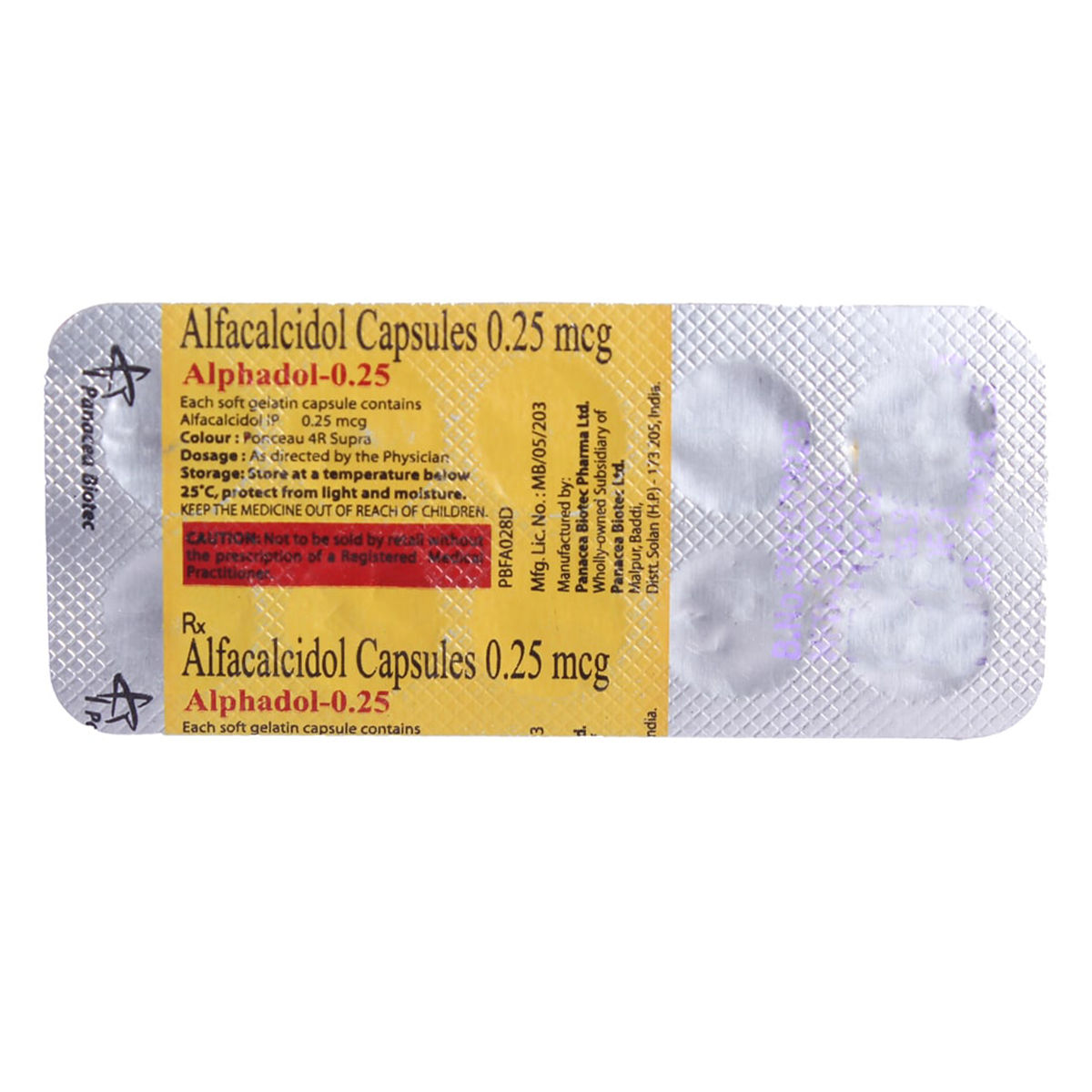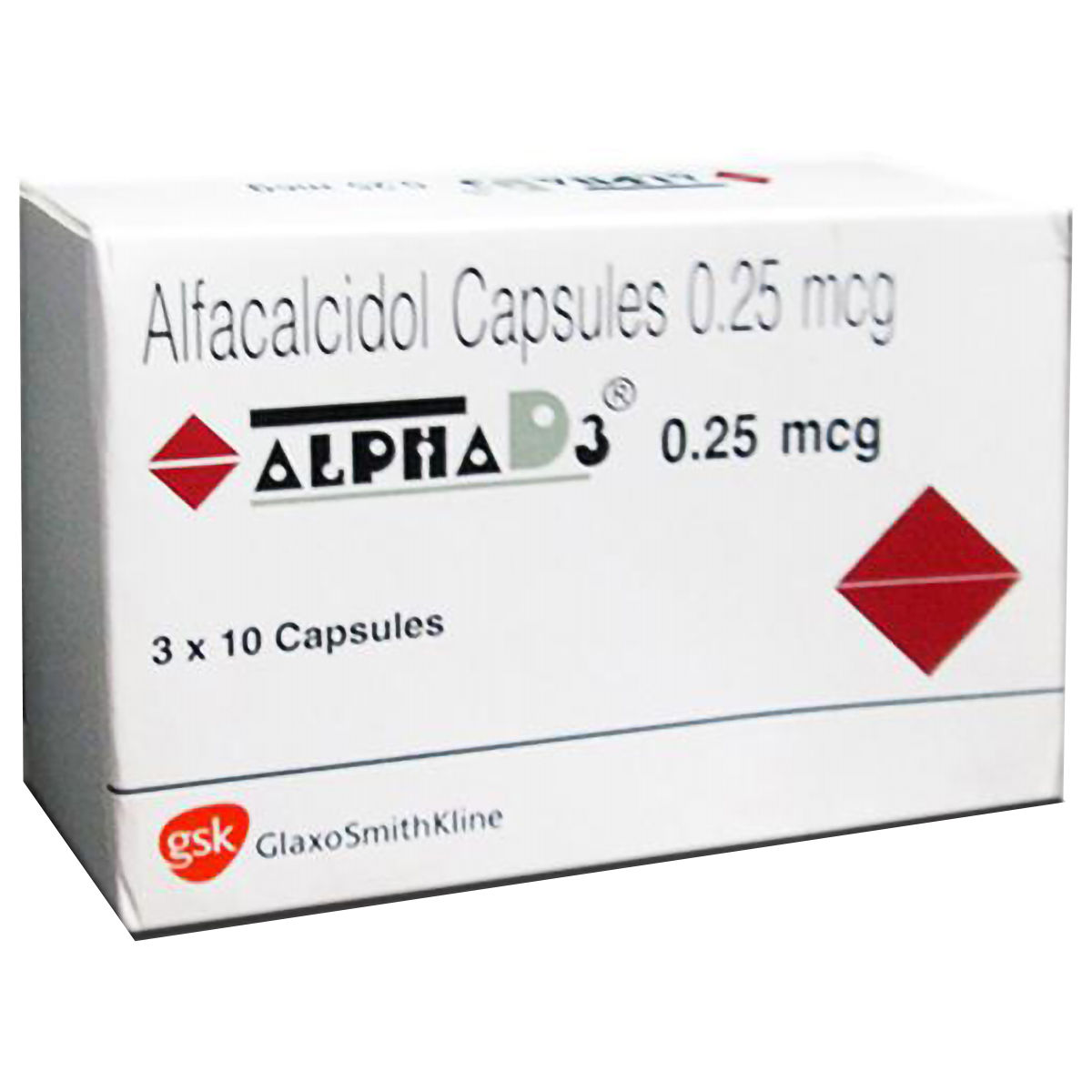Decalcid 0.25mcg Tablet
₹59.05*
MRP ₹65.61
10% off
₹55.77*
MRP ₹65.61
15% CB
₹9.84 cashback(15%)
Free Delivery
With Circle membership
(Inclusive of all Taxes)
This offer price is valid on orders above ₹800. Apply coupon PHARMA10/PHARMA18 (excluding restricted items)
Know Your Delivery Time
Provide Delivery Location


Secure Payment

India's Most Trusted Pharmacy

Genuine Products
Composition :
Manufacturer/Marketer :
Consume Type :
Return Policy :
About Decalcid 0.25mcg Tablet
Decalcid 0.25mcg Tablet is primarily used to treat low blood calcium and phosphate levels. Decalcid 0.25mcg Tablet effectively treats Vitamin D deficiency, renal osteodystrophy (changes in bone caused by kidney failure), hyperparathyroidism (parathyroid glands make high levels of calcium in the body), hypoparathyroidism (parathyroid glands make low levels of calcium in the body), hypocalcaemia (low levels of calcium), and rickets or osteomalacia (softening or deforming of bones due to lack of calcium). Vitamin D deficiency occurs when your body has low Vitamin D levels and is caused due to inadequate nutrition, intestinal malabsorption, or lack of exposure to sunlight.
Decalcid 0.25mcg Tablet contains 'Alfacalcidol,' which is an analogue of Vitamin D. It is a nutritional supplement activated by liver enzymes after intake. Alfacalcidol is further converted into the active form of vitamin D3 (calcitriol) and works by strengthening the bones by increasing the calcium and phosphate levels in the blood. Calcium and phosphate are essential substances to form healthy bones and teeth.
Your doctor will decide the dosage based on your medical condition. In some cases, it may cause side effects like weakness, fatigue, sleepiness, headache, loss of appetite, dry mouth, metallic taste, nausea, and vomiting. Most of these side effects of Decalcid 0.25mcg Tablet do not require medical attention and gradually resolve over time. However, if these side effects persist longer, please consult your doctor.
Please tell your doctor if you have hypercalcemia (high calcium levels), hypervitaminosis D (high vitamin D levels), and malabsorption syndrome (difficulty absorbing nutrition from food). Brief your medical history if you have any heart/kidney/liver/blood vessel diseases, sarcoidosis (growth of inflammatory cells in different parts of the body), or kidney stones. Pregnant or breastfeeding women should consult their doctor before taking Decalcid 0.25mcg Tablet. Decalcid 0.25mcg Tablet is safe to use in children when advised by the doctor.
Uses of Decalcid 0.25mcg Tablet
Directions for Use
Medicinal Benefits
Decalcid 0.25mcg Tablet is used to treat low blood calcium and phosphate levels. It contains Alfacalcidol, a vitamin D analogue. It is used to treat vitamin D deficiency, renal osteodystrophy, hyperparathyroidism, hypoparathyroidism, hypocalcaemia, and rickets or osteomalacia. Decalcid 0.25mcg Tablet is activated by liver enzymes after intake, which is further converted into the active form of vitamin D3 (calcitriol). It works by strengthening the bones by increasing the calcium and phosphate levels in the blood.
Side Effects of Decalcid 0.25mcg Tablet
- Weakness
- Fatigue
- Sleepiness
- Headache
- Loss of appetite
- Dry mouth
- Metallic taste
- Nausea
- Vomiting
Storage
Drug Warnings
Let your doctor know if you are allergic to Decalcid 0.25mcg Tablet or its inactive components. Decalcid 0.25mcg Tablet is not recommended if you have hypercalcemia (high calcium levels), hypervitaminosis D (high vitamin D levels), and malabsorption syndrome (difficulty absorbing nutrition from food). Brief your medical history if you have any heart/kidney/liver/blood vessel diseases, sarcoidosis (growth of inflammatory cells in different parts of the body), and kidney stones. Higher doses of Vitamin D than the recommended daily dose should be used in pregnant women only when advised by the doctor. Decalcid 0.25mcg Tablet is excreted into the breast milk; hence consult your doctor before taking Decalcid 0.25mcg Tablet if you are a breastfeeding mother. Drinking alcohol can affect calcium absorption; therefore, it is advised to limit alcohol intake while using Decalcid 0.25mcg Tablet. Decalcid 0.25mcg Tablet is safe to use in children only when advised by the doctor.
Therapeutic Class
Drug-Drug Interactions Checker List
- ALUMINIUM HYDROXIDE
- DIGOXIN
- DILTIAZEM
- VERAPAMIL
- CHLOROTHIAZIDE
- HYDROCHLOROTHIAZIDE
- INDAPAMIDE
- METOLAZONE
- CHLORTHALIDONE
- CALCIPOTRIENE
Diet & Lifestyle Advise
Include dairy products like milk, yoghurt, cheese or milk-based custard in your diet.
Eat daily a serving of broccoli, cabbage, bok choy, spinach and other green leafy vegetables.
Include the best dietary sources of vitamin D, such as fish liver oils and vitamin D–fortified milk.
Snack on calcium-rich nuts like Brazil nuts or almonds.
Sprinkle sesame seeds over your food, vegetables and salads. Sesame seeds are high in calcium.
Avoid or reduce the intake of caffeine, soft drinks and alcohol that inhibit calcium absorption.
Replace the meat with tofu or tempeh for extra calcium in your food.
Habit Forming
How Decalcid 0.25mcg Tablet Works
What if I have taken an overdose of Decalcid 0.25mcg Tablet
Alcohol
Caution
Drinking alcohol can affect calcium absorption; hence it is advised to limit the alcohol intake while using Decalcid 0.25mcg Tablet.
Pregnancy
Caution
During pregnancy, use higher doses of Decalcid 0.25mcg Tablet than the daily dietary allowance only when advised by the doctor. Your doctor will weigh the potential risks and benefits before recommending Decalcid 0.25mcg Tablet.
Breast Feeding
Caution
Consult your doctor before taking Decalcid 0.25mcg Tablet if you are breastfeeding. Decalcid 0.25mcg Tablet can pass into the breast milk. If Decalcid 0.25mcg Tablet is used during breastfeeding, please monitor the serum calcium levels of the mother and the infant.
Driving
Caution
If you experience any dizziness while using Decalcid 0.25mcg Tablet, do not drive or operate machinery. Please consult your doctor if you experience any dizziness.
Liver
Caution
Let your doctor know if you have any history of liver diseases before taking Decalcid 0.25mcg Tablet. Hepatic impairment/liver disease can alter the metabolic and therapeutic activity of certain Vitamin D forms.
Kidney
Caution
It is advised to seek doctor's advice before starting Decalcid 0.25mcg Tablet if you have kidney diseases like kidney stones or undergoing dialysis.
Children
Consult your doctor
The doctor will decide the dosage of Decalcid 0.25mcg Tablet based on the child's age and weight.
Country of origin
Manufacturer/Marketer address
Author Details
We provide you with authentic, trustworthy and relevant information
FAQs
Disclaimer
Product Substitutes














